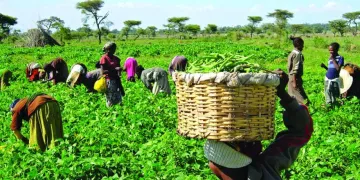Rainy season farmers in South-South decry lack of Govt. support

Some city returnees who are currently undertaking rainy season farming in the South-South region have decried lack of support from the government.
The farmers made the expression while responding to a News Agency of Nigeria (NAN) survey on the challenges being faced by wet season farmers in South-South region.
The farmers who spoke in separate interviews with NAN also urged the state governments in the region to support them with funds and farm inputs.
They further urged the governments to quickly address the security challenges in some communities to enable farmers to cultivate without fears.
NAN observes that some unskilled workers residing in the cities are currently returning to their communities to embark on rainy season farming.
One of them, Mr Richard Ndoma, an indigene of Ikom in Cross River, said that lack of funds and seeds was a major challenge to his interest to establish a large cassava farm in his community.
“I am interested in cultivating a large cassava farm, but I don’t have the needed funds and other basic inputs. The government should support us with loans and grants as they are doing to other farmers.
“Many of us do not have the money to cultivate our small farms, let alone venture into large-scale farming. We need money to hire manpower, farming requires many hands, the cost of hiring workers is so high,” he said.
Also speaking, Mike Ewa, from Boki, said that the current economic situation in the country had affected his plan for massive investment in farming during the rainy season.
“People may look at us as very small scale farmers, but we need the same inputs as the large scale farmers. We need fertilizers and pesticides too, but where is the fund to procure these items,” he said.
Elijah Ugani, from Yala, shared similar views with Ndoma and Ewa, and joined the call for government support.
“By leaving the city to work in the farm, we are promoting the call for food security. Apart from feeding our families, our produce are also sold in the markets to those who may not have the time to cultivate, so we need the support of the government,” Ugani said.
When contacted, Dr Erasmus Ekpang, the Commissioner for Information in Cross River, said that the Bassey Otu-led government was committed to supporting all category of farmers in the interest food security and sufficiency.
“Our government has been supporting farmers with inputs, we are committed to do more. Those who have yet to get our support should exercise patience,” he said.
In Rivers, the farmers also called for government support, and described wet season farming as a great opportunity to eliminate hunger and poverty.
The farmers who described wet season as the best for crop yield, stated that the benefits of rain to the soil and crops were numerous, and should not be undermined.
Mr Godwin Akandu, the President, Etche Farmers Cooperative Union, said that the rains provided a ‘rich opportunity’ for non-mechanised farmers to cultivate their crops.
Akandu, who cropped mainly cassava, yam, cocoyam and vegetables, said that although the rains could boost plant growth and yield, excessive rain fall could erode soil nutrients.
”In the event of excessive rain fall, soil nutrients are bound to diminish due to erosion, this development has the tendency to affect crop yeild,” he said.
Mrs Imelda James, from Abua, stated that excessive weed was a huge challenge to rainy season farming, saying:” tackling weeds can be strenuous, money is required to hire workers. Let’s not forget that crops and weeds cannot stay together”
James who said that Abua was known for the production yam, plantain, banana, vegetables among others, said that lack of fertilizers had negatively affected crop yield.
“We cultivate our farms on the same land for several years without applying fertilizers. We also do not use pesticides because the soil here is blessed with natural nutrients, but these nutrients wither away after some time, making the soil to require fertilizers.
“To summarize it all, our challenges during wet season farming are weeds, lack of fertilizer and pest control agents. We need the support of the government to surmount these challenges,” she said.
In Akwa Ibom, the farmers, said that although wet season farming was capital intensive, it could be very rewarding if the right measures were taken.
Mr Akpan Inem, from Ibiono, said that wet season farming should be seen as a serious economic activity, and not a venture for the frustrated in the society.
Inem said that government at all levels should provide support to citizens that showed interest in wet season farming in order to boost local food production.
He said that it took serious discipline and sense of commitment for people to leave the cities to cultivate farms during the rainy season, adding,” it shows hard work and commitment to be self-reliant. So such persons need to be supported”
Mr Aniedi Edet, a Civil Servant in Ikot Ekpene, said that his interest in wet season farming had been plagued by lack of funds to invest.
“From the beginning to the end, farming requires money. You must acquire land, buy seedlings, hire labour, get fertilizers and pesticides, these things are not given for free.
“I take my leave every year to cultivate my farm during the wet season, sometimes I am over-worked because I can’t hire workers. My crops die sometimes because I don’t have access to improved seeds and pesticides, the challenges are numerous” he said.
Speaking at recent public function, Dr Owoidighe Ekpoattai, the Special Adviser to Gov. Umo Eno on Agricultural Development, said that the state government was willing to support anyone who was genuinely ready to go back to the farm.
“This government has encouraged rural farming by ensuring grassroots access to farming inputs.
“As a government, we believe that as long as the earth remains, seedtime and harvest shall not cease. Farming guarantees food security, financial stability and employment. Everyone needs to return to agriculture,” Ekpoattai said.
NAN reports that government’s across the world are encouraging their citizens to indulge in farming as a way of boosting food sufficiency.
Experts say abundant rainfall supports increased crop yield, reduces water scarcity, and provides natural irrigation for soil moisture and germination.NAN



